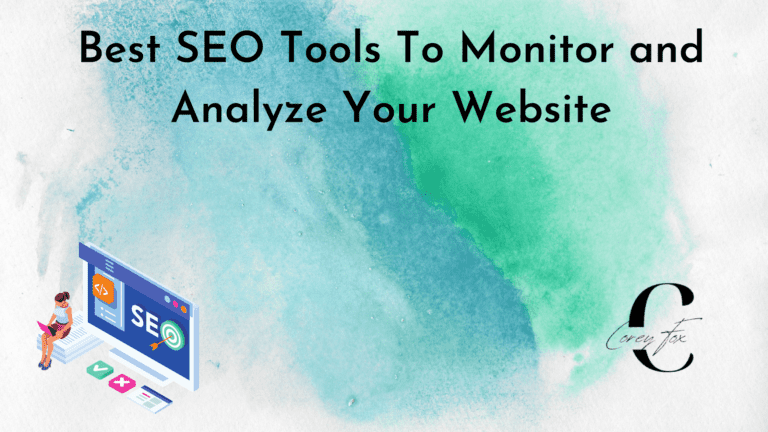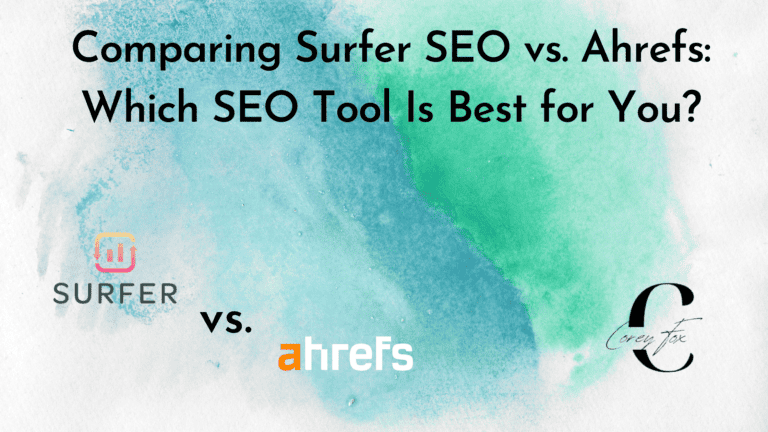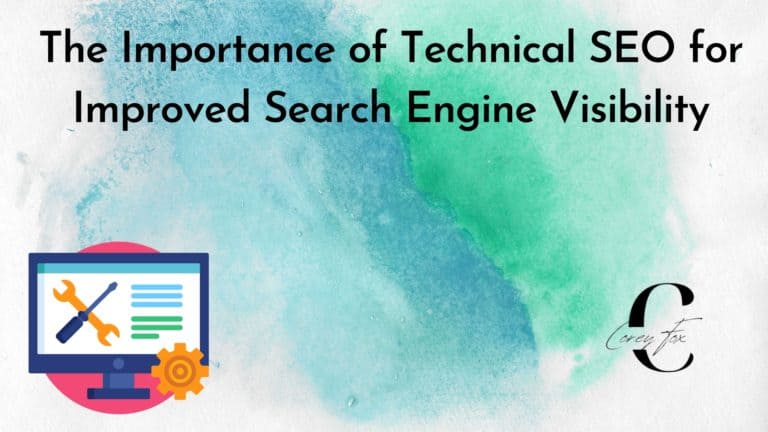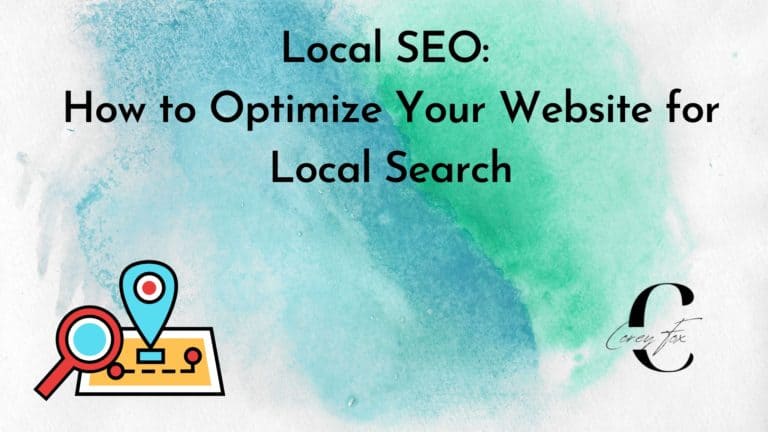SEO for Small Business: How to Compete With The Big Players
Last Updated on October 3, 2023 by Corey Fox
In today’s digital age, search engine optimization (SEO) has become a crucial component of any successful marketing strategy. As a small business owner, you may feel overwhelmed by the thought of competing with larger players in your industry. But fear not! In this article, I will explain the importance of SEO for small businesses, the challenges you may face, and provide a step-by-step guide on how to optimize your website to compete with the big players.
Explanation of SEO and Its Importance
SEO, or Search Engine Optimization, is a marketing strategy used to improve the visibility and ranking of your website in search engine results pages (SERPs).
The goal of SEO is to increase the quantity and quality of organic traffic to your website, which in turn can lead to more leads, conversions, and revenue for your business.
When a user enters a search query into a search engine like Google, the search engine’s algorithm scans its index of websites and web pages to determine the most relevant results for that query.
The algorithm takes into account a wide range of factors, such as the content of the website or page, the relevance and quality of the target keywords used, the structure and layout of the website, and the number and quality of inbound links pointing to the website or page.
By optimizing your website and its content for search engines, you can improve your chances of appearing at the top of search results for relevant queries. This can help you attract more qualified leads to your website, increase your brand’s visibility and authority, and ultimately drive more conversions and revenue for your business.
It’s worth noting that SEO is a complex and constantly evolving field, with search engines frequently updating their algorithms and ranking factors. As such, it’s important to stay up-to-date with the latest trends and best practices in SEO and to continuously monitor and adjust your strategy to ensure maximum effectiveness.
In today’s digital age, having a strong online presence through SEO is critical to the success of any business, regardless of size or industry.
With over 5 billion searches conducted daily on Google alone, the potential reach and impact of SEO are enormous, making it a powerful tool for other businesses looking to grow and succeed in the online marketplace.
Challenges Faced by Small Businesses in SEO
One of the most significant challenges faced by small businesses is the limited resources they have to dedicate to SEO.
Additionally, larger players in your industry may have more established websites and stronger backlink profiles, making it more challenging to outrank them. However, with the right approach and tactics, small businesses can still compete and succeed in the world of SEO.
Understanding SEO
SEO is a complex and ever-changing field, but there are basic principles and best practices that are essential for success.
These practices are designed to help businesses optimize their website and online presence to rank higher in search engine results pages (SERPs) and attract more potential customers.
Here are the main areas of focus that businesses need to understand to succeed in SEO:
- Identifying the target market: This involves identifying the search terms that people use to find products or services related to your business. By understanding the keywords and phrases that your target audience is using, you can optimize your website content to align with those search terms and rank higher in SERPs.
- On page SEO optimization: This refers to optimizing the content on your website for search engines. This includes optimizing the titles, meta descriptions, headings, and content to include relevant keywords and make it easier for search engines to understand the content of your website.
- Off page SEO optimization: This involves optimizing the elements outside of your website that affect your search engine rankings. This includes link building, social media marketing, and guest posting on other websites.
- Local SEO: Local SEO is important for small businesses that have a physical location or serve a specific geographic area. This involves optimizing your website and online presence to appear in local search results and attract more local customers.
- Monitoring and analytics: To be successful in SEO, it is important to monitor your progress and track your results. This involves using analytics tools to track website traffic, search engine rankings, and other important metrics to measure the success of your SEO efforts and make adjustments as needed.
By understanding these basic principles and best practices, small businesses can compete with larger competitors in SEO and attract more potential customers through their online presence.
However, it is important to keep in mind that SEO is a long-term investment, and results may take time to materialize. It is important to be patient and consistent with your efforts to see the best results over time.
Identifying the Target Market

Understanding your target audience and conducting competitor research are critical to developing a successful SEO strategy.
This includes identifying profitable keywords and tailoring your content to meet the needs and interests of your target market.
Understanding the Target Audience
On-page optimization refers to the process of optimizing individual web pages to rank higher in SERPs and drive more organic traffic.
This includes optimizing your title tags and meta descriptions, content, and images to make them more search engine and user-friendly.
Competitor Research
Competitor research is an effective way to identify your target market.
By analyzing your competitors’ websites, social media presence, online reviews, and marketing campaigns, you can gain valuable insights into their target audience and the types of content and marketing strategies that resonate with them.
Identifying Profitable Keywords
Identifying profitable keywords is critical to the success of your SEO efforts.
By using a keyword research tool, you can identify the keywords and phrases that potential customers use to search for products or services in your industry.
Use this information to optimize your website and its content for these keywords and improve your chances of ranking higher in the SERPs.
On-Page SEO Optimization

Importance of On-Page Optimization
On-page optimization is crucial for improving website visibility, user experience, and engagement.
By optimizing your website, you can improve your website’s click-through rates, reduce bounce rates, and increase conversions.
Title Tags and Meta Descriptions
Title tags and meta descriptions are HTML elements that provide information about the content of a web page.
By optimizing your title tags and meta descriptions with relevant keywords and compelling descriptions, you can increase the chances of users clicking on your website in SERPs.
Content Optimization
Content optimization involves creating high-quality and informative content that aligns with your target audience’s interests and search queries.
By incorporating relevant keywords and optimizing your content structure, you can improve your website’s visibility and ranking in SERPs.
Image Optimization
Image optimization involves optimizing the size, format, and alt text of your website’s images.
By doing so, you can improve your website’s load times and make your content more accessible to users and search engines
Off-Page SEO Optimization
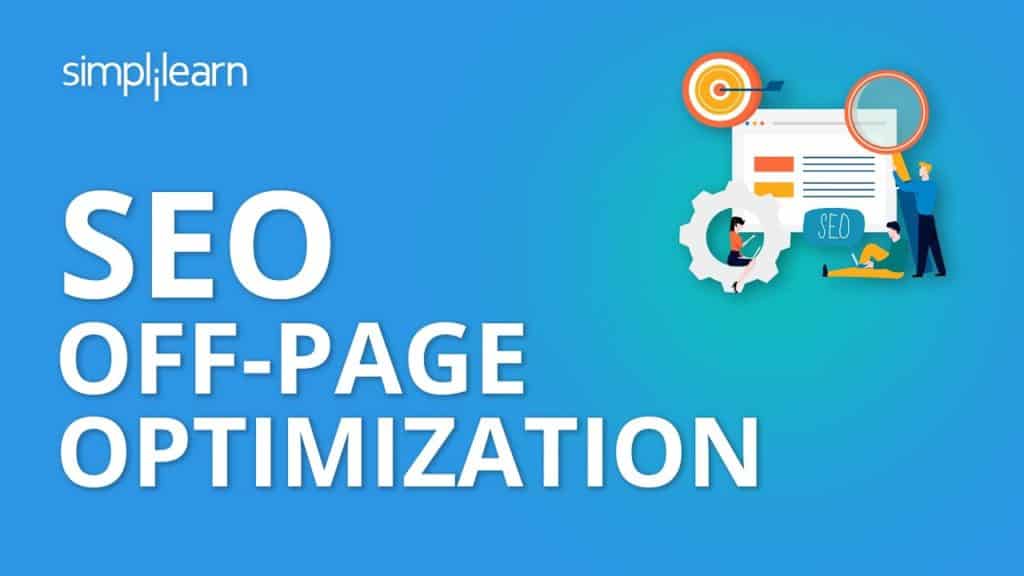
Off-page optimization involves activities that occur outside of your website to improve your website’s ranking and visibility. This includes link building, guest posting, blogger outreach, and social media marketing.
Explanation of Off-Page Optimization
Off-page optimization is critical to improving your website’s authority, relevance, and credibility.
By building high-quality backlinks from reputable sources, you can improve your website’s ranking and visibility in SERPs.
Importance of Link Building
Link building is the process of acquiring backlinks to your website from other reputable and relevant websites.
By building high-quality backlinks, you can improve your website’s authority and relevance, leading to higher rankings in SERPs.
Guest Posting and Blogger Outreach
Guest posting and blogger outreach involve creating content for other websites in your industry to build backlinks and increase brand exposure.
By doing so, you can improve your website’s authority and relevance while reaching a wider audience.
Social Media Marketing
Social media marketing involves promoting your brand and content on social media platforms to increase brand awareness and drive traffic to your website.
By using social media platforms to engage with your target audience, you can improve your website’s visibility and attract more qualified leads.
Local SEO

Local SEO involves optimizing your website for local search queries to attract customers in your geographical area.
This includes creating a Google My Business profile, building local citations, and managing customer reviews.
Understanding the Importance of Local SEO
Local SEO is essential for businesses with physical locations as it can help attract customers in your area, increase foot traffic, and drive sales.
By optimizing your website for local search queries, you can improve your website’s visibility and ranking in local SERPs.
Google Business Profile
Creating a Google Business Profile is critical to improving your local business online.
By providing accurate and up-to-date information about your business, you can improve your website’s visibility in local SERPs and attract more local customers.
Local Citations
Local citations are online references to your business’s name, address, and phone number (NAP). By building high-quality and consistent local citations, you can improve your website’s authority and relevance, leading to higher rankings in local SERPs.
Customer Reviews
Managing customer reviews is critical to improving your website’s local SEO. By encouraging customers to leave reviews on your Google Business profile and other review sites, you can improve your website’s credibility and attract more local customers.
Monitoring and Analytics

Monitoring your SEO efforts and analyzing your website’s data is critical to improving your website’s visibility and ranking in SERPs.
This includes using analytics tools to measure your website’s traffic, engagement, and conversion rates.
Importance of Monitoring SEO Efforts
Monitoring your SEO efforts is critical to identifying areas for improvement and adjusting your strategy accordingly.
By regularly monitoring your website’s data, you can ensure that your SEO efforts are driving results and improving your website’s visibility in SERPs.
Analytics Tools
Analytics tools such as Google Analytics, Google Search Console, and SEMrush can provide valuable insights into your website’s traffic, engagement, and conversion rates.
By using these SEO tools, you can identify your website’s strengths and weaknesses and adjust your strategy accordingly.
Measuring SEO Success
Measuring your SEO success involves analyzing your website’s data and determining how your SEO efforts are contributing to your business goals.
By setting specific metrics and goals, you can track your progress and adjust your strategy accordingly to achieve better results.
Conclusion
SEO is a critical component of any successful marketing strategy, regardless of your business’s size.
By understanding the basic principles of SEO, identifying your target market, and optimizing your website for search engines and users, you can compete with the big players in your industry and drive more qualified leads to your website.
By incorporating these strategies and tactics into your SEO efforts, you can improve your website’s visibility, ranking, and ultimately, your bottom line.
While SEO may seem overwhelming at first, it’s important to remember that it’s a continuous process that requires time, effort, and patience.
By investing in your website’s SEO and staying up-to-date with the latest trends and best practices, you can improve your website’s visibility, attract more qualified leads, and ultimately, grow your business.
In summary, here are some key takeaways from this blog post on SEO for small business owners:
- SEO is critical to improving your website’s visibility and rankings, and ultimately, driving more qualified leads to your website.
- Small businesses face unique challenges when it comes to SEO, including limited resources and competition from larger players.
- Understanding the basic principles of SEO, including keyword research, on-page optimization, and off-page optimization, is essential to improving your website’s ranking and visibility in SERPs.
- Local SEO is critical for small businesses with physical locations and involves optimizing your website for local search queries to attract more local customers.
- Monitoring your SEO efforts and analyzing your website’s data is critical to measuring your success and adjusting your strategy accordingly.
By implementing these strategies and tactics into your SEO efforts, you can compete with the big players in your industry and drive more qualified leads to your website.
Remember, SEO is a continuous process that requires time, effort, and patience, but the rewards are well worth it.


